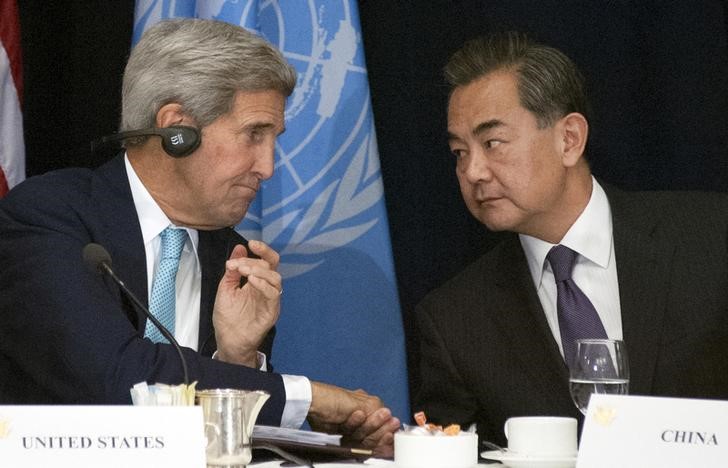Investing.com’s stocks of the week
BEIJING (Reuters) - The United States needs to respect China's core interests, including stopping weapons sales to Taiwan and ending military patrols close to islets controlled by China in the South China Sea, the country's foreign minister told his U.S. counterpart.
In a telephone call with U.S. Secretary of State John Kerry, Chinese Foreign Minister Wang Yi said the world is becoming a more challenging place, according to a Chinese Foreign Ministry statement released on Monday.
"As the U.S. seeks cooperation with China, it ought to respect China's core interests and important matters of concern," the statement paraphrased Wang as saying.
Wang explained to Kerry China's position on Taiwan and the South China Sea, asking the United States to end arms sales to the self-ruled island and stop "shows of force" with ship and aircraft patrols close to Chinese-controlled island in the disputed South China Sea, the statement added.
The U.S. angered China last week by approving a new round of weapons sales to Taiwan.
Defeated Nationalist forces fled to the island at the end of a civil war with the Communists in 1949 and Beijing has never renounced the use of force to bring it under its control.
China has also been upset with what it sees as provocative U.S. actions in the South China Sea, including the patrols.
The Pentagon said on Friday it was looking at Chinese complaints that a B-52 bomber recently flew near a Chinese artificial island in the South China Sea, a sensitive issue because the two powers disagree over Beijing's territorial claims in the region.
At a regular news briefing in Washington, U.S. State Department spokesman John Kirby confirmed Wang and Kerry discussed the South China Sea. He declined to give details but said the U.S. aim in such talks was to reduce tensions and "to express our continued concern over the militarization of ... manufactured land features."
Kirby also declined to discuss specifics of the B-52 flight but said the United States has "made clear that, with respect to international law, we'll fly, sail and operate our military assets where we need to."
China claims almost all of the energy-rich waters of the South China Sea, through which more than $5 trillion of maritime trade passes each year. The Philippines, Brunei, Vietnam, Malaysia and Taiwan have overlapping claims.
Wang and Kerry also discussed the crisis in Syria and the Iran nuclear deal, China's Foreign Ministry added.
